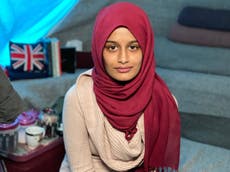Shamima Begum: The story of the Isis bride fighting to regain British citizenship
Supreme Court set to decide whether former London schoolgirl should be allowed to return to the UK
Your support helps us to tell the story
From reproductive rights to climate change to Big Tech, The Independent is on the ground when the story is developing. Whether it's investigating the financials of Elon Musk's pro-Trump PAC or producing our latest documentary, 'The A Word', which shines a light on the American women fighting for reproductive rights, we know how important it is to parse out the facts from the messaging.
At such a critical moment in US history, we need reporters on the ground. Your donation allows us to keep sending journalists to speak to both sides of the story.
The Independent is trusted by Americans across the entire political spectrum. And unlike many other quality news outlets, we choose not to lock Americans out of our reporting and analysis with paywalls. We believe quality journalism should be available to everyone, paid for by those who can afford it.
Your support makes all the difference.Shamima Begum’s potential return to the UK to fight the government’s decision to strip of her British citizenship is being considered by the Supreme Court this week.
It marks the possible culmination of one of the most controversial legal battles in British history, as judges prepare to consider whether someone can be made “stateless”.
In the first day of the hearing on Monday, a lawyer representing the home secretary said Begum was in Syria due to “self-inflicted" reasons. Her lawyers are due to put forward their arguments on Tuesday.
So who is Begum and why was her citizenship taken away?
The 21-year-old grew up in east London, and was one of three schoolgirls from the capital who travelled to Syria to join Isis in February 2015.
The former Bethnal Green Academy pupil lived under the rule of the terrorist group for more than three years before she was found, nine months pregnant, living in a Syrian refugee camp last February.
Then-home secretary Sajid Javid revoked her British citizenship on national security grounds later that month. “My number one job is to do whatever I can to keep this country safe,” he said.
Then Labour party leader Jeremy Corbyn joined human rights groups defending Begum’s right to be granted legal aid so she could challenge the decision.
Having obtained legal representation in April 2019, Begum’s lawyers then challenged Mr Javid’s decision and accused the government of making her stateless – as well exposing her to the risk of death or inhuman and degrading treatment.
In July 2020, the Court of Appeal ruled that “the only way in which she can have a fair and effective appeal is to be permitted to come into the United Kingdom to pursue her appeal”.
Lord Justice Flaux said: “Fairness and justice must, on the facts of this case, outweigh the national security concerns, so that the leave to enter appeals should be allowed.”
Later that month, the Court of Appeal gave permission for both the Home Office and Begum to take their case to the UK’s highest court – but ordered a “stay” on Begum’s return “until further order by the Supreme Court”.
At a remote two-day hearing starting on Monday, the Supreme Court began considering whether Begum should be allowed to return to the UK to appeal against the deprivation of her British citizenship.
Five Supreme Court justices, led by the court’s president Lord Reed, will also consider whether Begum’s appeal should be allowed even if she is refused leave to enter the UK.
Begum currently lives in Al-Roj camp, the north eastern Syrian refugee camp she was moved to after being first discovered last year. Her lawyers describe conditions there as “dire”.
She was said to be delighted but also “very nervous” after the Court of Appeal’s July ruling that she should, pending Supreme Court approval, be allowed to return to the UK to appeal against the removal of her citizenship.
According to a member of the camp’s security forces, the now 20-year-old was “very happy” about a possible return – but is concerned “about what will happen to her and how people will look at her there”.
Begum says she married Dutch convert Yago Riedijk 10 days after arriving in Isis territory in February 2015, with her school friends also reportedly marrying foreign Isis fighters.
She told The Times last February that she left Raqqa in January 2017 with her husband but her children, a one-year-old girl and a three-month-old boy, had both since died.
Her third child died shortly after he was born. According to the Egmont Institute, dozens of British children are being held in worsening conditions in Syrian camps for Isis detainees.
Elsewhere on Monday, the Special Immigration Appeals Commission (SIAC) will hear the cases of three individuals with British-Bangladeshi heritage whose British citizenship has been revoked on the grounds of national security.

